#marjorie grene
Text
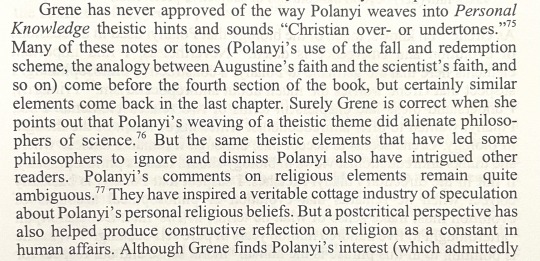
Phil Mullins, "On Persons and Knowledge" in The Philosophy of Marjorie Grene
In a reply to another contributor, Grene has this to say:

0 notes
Video
Marjorie Taylor Greene on her podcast: “You’re damn right we’re upset over drag queens.”. Marjorie Taylor Grenee’s boyfriend, RSBN’s Brian Glenn in drag.
0 notes
Quote
We are friends, but you can’t agree with his philosophy. It doesn’t exist! He’s a wit! He should’ve lived in the eighteenth century. He just makes clever remarks that don’t mean anything. The thing about Philosophy and the Mirror of Nature is based on a total misinterpretation of Kant. It’s totally wrong about Kant, and I’m sort of a Kant person.
Marjorie Grene on Richard Rorty
#there are other more important things she says but this is my favorite#marjorie grene#richard rorty#philosophy#kant#archivist#quote
12 notes
·
View notes
Photo
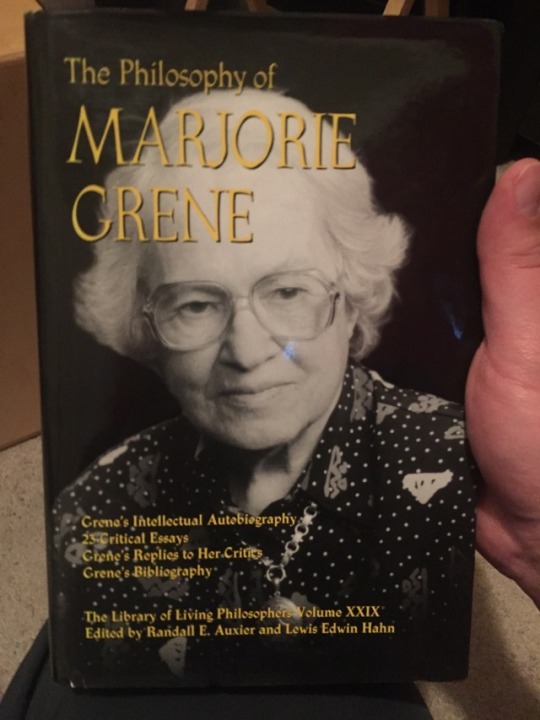


I’m always super excited to get my hands on a book from this series 😱
1 note
·
View note
Text
Biyoloji Felsefesi

Son 30 yılda biyolojiye olan felsefi ilginin artması, biyolojik bilimlerin aynı dönemde artan önemini yansıtmaktadır. Günümüzde birçok farklı biyoloji konusunda geniş bir literatür vardır ve bu literatürdeki çalışmaların bütününü tek bir kalemde özetlemek imkânsızdır. Bu yüzden bu yazı biyoloji felsefesinin ne olduğunu açıklamayı amaçlamaktadır. Biyoloji neden felsefe için önemlidir ya da tam tersi, felsefe neden biyoloji için önemlidir?
Biyoloji felsefesinin genel başlığı altında üç farklı felsefi sorgulama vardır. İlk olarak bilim felsefesindeki genel tezler biyoloji bağlamında ele alınır. İkinci olarak biyolojinin kendisindeki kavramsal bulmacalar felsefi analize tabi tutulur. Son olarak geleneksel felsefi sorular tartışılırken biyolojiye başvurulur. İlk iki felsefi çalışma sıklıkla gerçek biyolojinin ayrıntılı bilgi bağlamında yürütülür. Üçüncüde bu daha azdır.
Biyoloji felsefesi ayrıca biyolojik kuramların belli alanlarına göre alt kategorilere ayrılabilir. Biyoloji paleontoloji gibi tarihi bilimlerden biyoteknoloji gibi mühendislik bilimlerine kadar çeşitli disiplinlerin bir bütünüdür. Her alanda farklı felsefi konular ortaya çıkmaktadır. Bu yazının son bölümü ise filozofların biyolojideki bazı ana disiplinlere nasıl yaklaştığını ele almaktadır.
1. Biyoloji Felsefesinin Geçmişi
2. Biyoloji Felsefesinin Üç Türü
3. Evrimsel Biyoloji Felsefesi
4. Sistematik Biyoloji Felsefesi
5. Moleküler Biyoloji Felsefesi
6. Gelişimsel Biyoloji Felsefesi
7. Ekoloji ve Koruma Biyolojisi Felsefesi
8. Biyoloji Felsefesinde Metodoloji
1. Biyoloji Felsefesinin Geçmişi
Çoğu belirgin yenilikte olduğu gibi yakından bir bakış biyoloji felsefesinin ilk zamanlarını ortaya sermektedir. 1950’lerde biyolog J. H. Woodger ve filozof Morton Beckner biyoloji felsefesi üzerine önemli çalışmalar yayımladılar (Woodger 1952; Beckner 1959) ancak daha sonraki felsefi literatürü meydana getiren çalışmalar, bu iki çalışma değildi. Bilim felsefesiyle ilgilenen bazı filozoflar biyoloji hakkında genel epistemolojik ve metafizik düşünceler temelinde iddialarda bulunmuştur. Belki de bu iddiaların en bilineni J. J. C. Smart’ın biyolojinin otonom bir bilim değil, radyo mühendisliği gibi daha temel bilimlerin teknolojik uygulaması olduğu iddiasıydı (Smart 1959, 366). Mühendislik gibi biyoloji de doğa yasalarına ekleme yapamaz. Yalnızca fizik ve kimya yasalarının belirli başlangıç ve sınır koşulları bağlamında nasıl ortaya çıktığını açıklayabilir. Hatta 1969’da zoolog Ernst Mayr ‘bilim felsefesi’ başlıklı kitapların tamamen yanıltıcı olduğunu ve ‘fizik felsefesi’ olarak yeniden başlıklandırılmasını bile savunmuştur (Mayr 1969). Bu yeni alanın ortaya çıkmasındaki etmen Mayr ve F. J. Ayala (Ayala 1976; Mayr 1982) gibi önde gelen biyologların girişimleriydi. Bilim felsefesinin ana görüşlerinden biri haline gelen biyoloji felsefesinin ilk işareti David Hull’ın “Philosophy of Biological Science (Biyoloji Biliminin Felsefesi)" eserinin önde gelen Prentice-Hall Felsefenin Temelleri serisinde yayımlanması olmuştur (Hull 1974). O andan itibaren bu alan hızlıca gelişmiştir. Robert Brandon, 1970’lerin sonlarından, “Biyoloji felsefesiyle ilgilenen beş filozof biliyorum: Marjorie Grene, David Hull, Michael Ruse, Mary Williams ve William Wimsatt.” şeklinde bahsetmiştir (Brandon 1996, xii-xiii). Ancak 1986’ya gelindiğinde Michael Ruse’un “Biology and Philosophy” dergisinin yayımlanması için gerekenden çok daha fazla filozof vardı.
2. Biyoloji Felsefesinin Üç Türü
Daha önce bahsedildiği gibi üç farklı felsefi sorgulama biyoloji felsefesinin genel başlığı altında yer almaktadır. İlk olarak bilim felsefesindeki genel tezler biyoloji bağlamında ele alınır. İkinci olarak biyolojideki kavramsal bulmacalar felsefi analize tabi tutulur. Son olarak geleneksel felsefi sorular tartışılırken biyolojiye başvurulur. Biyoloji felsefesindeki ilk büyük tartışma, bu sorgulamaların ilkine, yani bilim felsefesindeki genel başlıkları incelemede biyoloji biliminin kullanılmasına örnek olarak gösterilebilir. Kenneth F. Schaffner mantıksal deneyci teori indirgeme modelini klasik Mendel genetiği ve yeni moleküler genetik arasındaki ilişkiye uygulamıştır (Schaffner 1967a; Schaffner 1967b; Schaffner 1969). David Hull bu girişimden çıkarılacak dersin Mendel genetiğinin moleküler genetiğe indirgenemez olduğunu ileri sürmüştür (Hull 1974; Hull 1975). Bu tartışma 1970 ve 1980’lerdeki özel bilimlerin daha temel bilimlerden özerk olduğunu savunan kısmi fikir birliğini güçlendirmiştir (Fodor 1974; Kitcher 1984). Ancak biyolojideki moleküler devrimin bilimsel indirgemenin başarılı bir örneği olmadığı iddiasının apaçık mantıksızlığı da çok daha yeterli teori indirgeme modellerinin oluşmasına yol açmıştır (Wimsatt 1976; Wimsatt 1980; Schaffner 1993; Waters 1994; Sarkar 1998).
Diğer bir önemli tartışmada ise filozoflar biyolojinin kendi içindeki kavramsal bulmacaları çözmeye çalışmıştır. Üreme başarısı kavramı evrim teorisinin merkezinde olmasına karşın her zaman tartışmalı olmuştur. Bu kavram şaşırtıcı bir şekilde biyologların “eğer evrim yasalarını tam anlamıyla oluşturmaya çalışırsak totolojilere indirgiyor gibi görünürüz. Bu nedenle Andromeda'da bile ‘uyum başarısı en yüksek olan hayatta kalır’ dediğimiz farz edildiğinde, ‘uyum başarısı’nı ‘hayatta kalma’ açısından tanımlamak gereklidir” eleştirisinden kaçmasının zor olduğunu kanıtlamıştır (Smart 1959, 366). 1970’lerde biyoloji felsefesiyle ilgilenen yeni nesil filozoflar, uyum başarısının organizmaların bağlı özelliği olduğunu, diğer bir deyişle her bir organizmanın uyum başarısının o organizmanın belirli fiziksel özelliklerinin ve çevresinin bir sonucu olduğunu ancak aynı seviyede uyum başarısına sahip iki organizmanın çok farklı fiziksel özellikler vasıtasıyla da aynı seviyede uyum başarısını yakalayabileceğini belirterek başlamışlardır (Rosenberg 1978). Alexander Rosenberg ve Mary B. Williams uyum başarısının, anlamını evrim teorisinin aksiyomatik formülasyonundan alan indirgenemez ilkel bir isim olduğunu savunarak tartışmaya devam etmiştir (Rosenberg 1983; Sober 1984a; Williams & Rosenberg 1985). Ancak totoloji problemine açık ara en çok tercih edilen çözüm, bu bağlı özelliğin doğal bir eğilim, yani muhtemel döl sayısının olasılık dağılımı olduğunu ileri sürmekti (Mills & Beatty 1979). Uyum başarısı üreme başarısı olarak tanımlansa da uyum başarısı en yüksek organizmaların en çok döle sahip olması, zar atıldığında çift rakam gelme olasılığının altı gelmesi olasılığından daha yüksek olması totolojisinden daha farklı değildir. Uyum başarısı yüksek organizmaların hayatta kalma ve zar atıldığında her sayının eşit olasılığa sahip olma eğilimleri, ne olacağı hakkında hatalı öngörülerde bulunmamıza neden olmaktadır ama örneklem boyutu arttıkça bu öngörüler daha güvenilir hale gelmektedir. Ancak popülasyon biyolojisinde aslında uyum başarısının oynadığı tüm rolleri oynayabilen bir olasılık dağılımı veya dağılım kümesi belirlemenin mümkün olup olmadığı ise belirsizdir.
"Kavramsal bulmaca" ifadesi ise çok geniş anlamıyla anlaşılmalıdır. Biyoloji felsefesiyle ilgilenen filozofların yaptığı kavramsal çalışmalar çoğu durumda teorik biyolojiyle iç içedir. Bu çalışmalar ayrıca filozofların biyologlar tarafından oluşturulan argüman zincirlerini eleştirmesine ve böylece süregelen biyoloji tartışmalarına doğrudan girmelerine yol açmaktadır. Aynı şekilde bilim felsefesindeki genel konular üzerinde çalışmak için biyolojiden örneklerin kullanılması olarak tanımlanan biyoloji felsefesinin ilk türü, bazen biyoloji metodolojisinin gelişmesine yönelik belirli tavsiyeler yoluyla biyolojiye geri bildirimde bulunmaktadır. Filozofların sıklıkla biyoloji dergilerinde ve biyologların da biyoloji felsefesi dergilerinde yayım yapmaları biyoloji felsefesi literatürünün şaşırtıcı bir özelliğidir. Biyoloji felsefesi biyoloji ve toplum arasında önemli bir aracı rolü de üstlenmektedir. Biyolojinin popüler açıklamaları deneysel bulgulardan çok fazla bilgi edinmektedir. Bu nedenle bilim felsefesiyle ilgilenen filozofların belirli biyolojik bulguların önemine dair yorumları değerlendirmede bariz bir rolü de vardır (Stotz & Griffiths 2008).
Biyoloji felsefesinin üçüncü bir türü de filozoflar etik ve epistemoloji gibi geleneksel felsefi konulardaki görüşleri desteklemek için biyolojiye başvurduklarında ortaya çıkmaktadır. Biyolojik teleolojiye dair geniş literatür bunun tipik bir örneğidir. Teleolojik dilin evrimsel yorumunu ifade etmek için ‘teleonomi’ teriminin ortaya çıktığı dönemde (Pittendrigh 1958) ‘modern sentez’in doğuşuna olan kısa bir ilgiden sonra işlev ve amaç yönelimli bakış açısı evrimsel biyologlar tarafından nispeten sorunsuz olarak görülmüştür. Fakat 1970’lerde filozoflar hastalık ve bozukluk gibi normatif kavramlara sağlam ve bilimsel bir temel sağlamak için biyolojiye başvurmaya başlamışlardır (Wimsatt 1972; Wright 1973; Boorse 1976). En nihayetinde bu felsefi tartışma, modern sentez biyolojisiyle ilgili görüşe temel olarak benzer bir teleolojik dil analizi sağlamıştır (Millikan 1984; Neander 1991). İşlevin ‘etiyolojik kuram’ına göre bir özelliğin işlevleri o özelliğin seçilmesini sağlayan etkinliklerin bir bütünüdür. ‘Etiyolojik’ veya ‘doğru’ işlev genel olarak felsefenin, özellikle de dil ve zihin felsefesinin kavramsal araç setinin bir parçası haline gelmiştir.
3. Evrimsel Biyoloji Felsefesi
Biyoloji felsefesi ayrıca biyolojik kuramların belli alanlarına göre alt kategorilere ayrılabilir. Yakın zamana kadar evrim teorisi felsefe alanında en çok ilgi çeken konuydu. Bu çalışma bilim felsefesinde kuramların ‘anlamsal görüşü’ gibi genel bir tezi desteklemek için tasarlanmıştır (Lloyd 1988). Ancak bu çalışmanın çoğu, teorinin içinde gelişen kavramsal bulmacalarla ilgilenmektedir ve çoğu zaman saf bilim felsefesine olduğu kadar kuramsal biyolojiye de benzemektedir. Elliot Sober’in “The Nature of Selection: Evolutionary theory in philosophical focus (Seçilimin Doğası: Felsefi açıdan evrim teorisi” (Sober 1984b) adlı klasik çalışmasının vurguladığı nokta, çoğu filozofun biyoloji felsefesinden haberdar olmasını sağlamıştır. Sober, popülasyon genetiğindeki açıklama yapılarını dinamikteki kuvvetlerin birleşimine benzeşim (anoloji) yoluyla analiz etmiş ve gen frekansında zamanla meydana gelen esas değişimi seçilim, sürüklenme ve mutasyon gibi birçok farklı ‘kuvvet’in sonucu olarak ele almıştır. Geleneksel evrim teorisinin matematiksel özü olan popülasyon genetiğinin böylesine itinalı ve metodolojik analizi ilginç sonuçlar vermeye devam etmektedir (Pigliucci & Kaplan 2006; Okasha 2007).
1980’lerde evrim teorisine olan yoğun felsefi ilgi kısmen E.O. Wilson’ın “Sociobiology: The New Synthesis (Sosyobiyoloji: Yeni Bir Sentez)" (Wilson 1975) ve Richard Dawkins’in “Gen Bencildir (The Selfish Gene)” (Dawkins 1976) kitaplarının yayımlanmasıyla ortaya çıkan sosyobiyoloji üzerine tartışmalarla açıklanabilir. Gerçek evrim biriminin tek tek her bir Mendel aleli olduğu iddiası, ‘seçilim birimi’ sorusu (Brandon and Burian 1984) ve ‘adaptasyonculuk’ (Dupré 1987) konusu üzerine yapılan felsefi çalışmalarda bir patlamaya neden olmuştur. Muhtemelen bu sayede filozoflar uzun yıllar sonra 1990’larda evrimsel biyoloji içindeki bazı ‘grup seçilimi’ formlarının rehabilitasyonuna büyük katkıda bulunmuş oldu (Sober and Wilson 1998).
‘Adaptasyonculuk’ üzerine yapılan tartışmalar evrimin optimal (en iyi) tasarımları meydana getirip getirmediği, optimalite varsayımlarının metodolojik rolü ve evrim teorisinin açıklama amaçları hakkında geniş bir alana yayılmış birtakım soruları içermeye başlamıştır. Yapılan felsefi çalışmalar, tartışmadaki bu durumları ayırt etmeye ve biyoloji literatüründe görülen ‘adaptasyonculuk’ lehinde ve aleyhindeki polemik karmaşayı azaltmaya yardımcı olmuştur (Orzack and Sober 2001).
4. Sistematik Biyoloji Felsefesi
Sistematiğin (E.N. taksonomi) felsefi tartışması 1960 ve 1970’lerde bu disiplinde meydana gelen ‘bilimsel devrim’e bir cevaptı. Bu devrim, sistematiği önce nicel yöntemlerin uygulanmasıyla, ardından sistematiğin tek amacının organizma grupları arasındaki evrimsel ilişkiyi (filogeni) temsil etmek olması gerektiğini savunan ‘kladistik yaklaşım’la dönüştürüldüğünü görmüştür. Bilim felsefesinden gelen fikirler her iki dönüşümü de savunmak için kullanılmıştır. Filozof David L. Hull bu iki devrim boyunca bilimsel tartışmalara aktif olarak katılmıştır (Hull 1965; Hull 1970; Hull 1988; ayrıca bk. Sober 1988).
Biyolog Michael Ghiselin’in, biyolojik türlerin ontolojik durumu hakkında sistematiğin temelde yanıldığını ileri sürmesi filozofların ilgisini uyandırmıştır (Ghiselin 1974). Türler, kimyasal elementlerin maddenin çeşitleri olduğu anlamda organizmaların çeşitleri değildir. Daha ziyade milletler ve galaksiler gibi tarihsel ögelerdir. Tek tek her bir organizma, evlilik yüzüğünün bir altın örneği olduğu anlamda türlerin örneği de değildir. Daha ziyade tıpkı bir bireyin ailenin bir parçası olması gibi türlerin birer parçalarıdır. Smart’ın daha önce belirttiği gibi bunun sonucu, biyolojik türler hakkında en azından evrende her zaman ve her yerde doğru olan geleneksel yasalar anlamında hiçbir ‘doğa yasası’ olmamasıdır (Smart 1959). Bu da biyoloji felsefesiyle ilgilenen filozofların yeni doğa yasaları anlayışını savunmalarına yol açmıştır (Mitchell 2000).
Ancak türlerin ‘bireyler’ olduğu görüşü, türler hakkındaki diğer önemli soruları cevapsız bırakmakta ve kendi içinde yeni sorunlara neden olmaktadır. Güncel biyoloji literatüründe yaklaşık yirmi farklı ‘tür konsepti’ görülmektedir ve bunların yararlı tarafları, karşılıklı ilişkileri, tutarlılıkları ya da tutarsızlıkları felsefi tartışmanın ana konusu olmuştur.
Biyolojik türler ‘doğal gruplaşma’nın (natural kind) klasik örneklerinden biridir. Sistematik felsefesi, genel bilim felsefesindeki sınıflandırma ve doğal gruplar hakkında yapılan son çalışmalar üzerinde büyük bir etkiye sahip olmuştur (Dupré 1993; Wilson 1999).
5. Moleküler Biyoloji Felsefesi
Daha önce bahsedildiği gibi Mendel genetiğinin moleküler genetiğe indirgenmesi biyoloji felsefesinde tartışılan ilk konulardan biriydi. Schaffner ile Hull arasındaki ilk tartışmayı ‘indirgeme karşıtı uzlaşı’ takip etmiştir (Kitcher 1984). İndirgemeci görüş Kenneth Waters’ın bir seri önemli yazısında yeniden canlanmıştır (Waters 1990; Waters 1994) ve güncel problem indirgeme ile indirgenemezlik arasında basit bir seçim olmasa da bu iki disiplin arasındaki bilişsel ilişki üzerine tartışma halen sürmektedir. Lidney Darden, Schaffner ve diğer düşünürler, moleküler biyolojideki açıklamaların tek bir ontolojik seviyeyle sınırlı olmadığını ve bu yüzden 19. yüzyıl fiziğinde fenomenolojik gaz yasalarının moleküler kinematiğe indirgenmesi gibi klasik örneklerden türeyen ‘indirgeme’ düşüncelerinin uygulanamaz olduğunu savunmuştur (Darden & Maull 1977; Schaffner 1993). Buna ek olarak moleküler biyoloji, doğa bilimlerinden aşina olunan birtakım yasa ve matematiksel model temeline oturtulmuş büyük bir kurama da sahip değildir. Bunun yerine bir model organizmada detaylı şekilde incelenip açıklanmış çok spesifik mekanizmalar, aynı ya da ilişkili moleküler etkileşenleri kullanan diğer organizmalardaki, aynı olmasa da, benzer mekanizmaların incelenmesine olanak sağlayan ‘örnek’ görevi görmektedir. Darden ve diğer düşünürler, varlıkların belli derlemleri ve kendilerine özgü aktiviteleri olan bu ‘mekanizmalar’ın yalnızca moleküler biyolojide değil, başka birçok özel bilim dalında da bilimsel keşfin ve bilimsel açıklamanın temel birimi olduğunu ileri sürmüştür (Machamer, Darden et al. 2000; ayrıca bk. Bechtel & Richardson 1993).
Moleküler biyoloji felsefesinde bir diğer önemli konu da genin tanımı olmuştur (Beurton, Falk & Rheinberger 2000; Griffiths & Stotz 2007). Filozoflar ayrıca genetik bilgi kavramı üzerine çokça eser yazmıştır. Bu konudaki literatürün genel düşüncesi, bu kavramın moleküler biyologların ona verdiği önemin hakkını teslim edecek şekilde yeniden yapılandırılmasının zor olduğudur (Sarkar 1996; Maynard Smith 2000; Griffiths 2001; Jablonka 2002).
6. Gelişimsel Biyoloji Felsefesi
1980’lerde ‘adaptasyonculuk’ yapılan üzerine tartışmalar, filozofları evrimsel biyoloji özelliklerinin açıklamaları ve aynı özelliklerin gelişimsel biyolojideki açıklamaları arasındaki karmaşık etkileşimlere yakınlaştırmıştır. Gelişimsel biyoloji seçilime maruz olabilecek muhtemel varyasyon türlerine ışık tutmaktadır ve evrimin sonuçlarının mevcut seçenekler (‘gelişimsel kısıtlamalar’) açısından ne kadar anlaşılabileceği sorusunu ortaya atmaktadır (Maynard Smith, Burian et al.1985). Gelişimsel kısıtlamalar üzerine yapılan tartışmalar, gelişimsel biyolojiye yalnızca evrimsel sorulara cevap sağlayıp sağlayamayacağı açısından bakmıştır. Ancak Ron Amundson’ın belirttiği gibi gelişimsel biyologlar kendi sorularını sormaktadır ama bu soruları sormak için farklı bir ‘kısıtlama’ kavramı gerekmektedir (Amundson 1994). 1990’larda her iki açıklamayı da birleştirmeyi vaat eden yeni bir alan olan evrimsel gelişimsel biyolojinin doğuşu bu alanı metodolojik bir bakış açısıyla nitelendirmeyi hedefleyen azımsanmayacak bir felsefi literatürü meydana getirmiştir (Maienschein & Laubichler 2004; Robert 2004; Amundson 2005; Brandon & Sansom 2007).
7. Ekoloji ve Koruma Biyolojisi Felsefesi
Yakın zamana kadar bu alan biyoloji felsefesinde çok geri kalmış bir alandı. Aslında bu durum şaşırtıcıdır çünkü bu alan yukarıda bahsedilen her üç biyoloji felsefesi yaklaşımı için de belirgin bir potansiyel taşımaktadır. Ayrıca çevre etiği üzerine önemli felsefi çalışmalar vardır ve bu alanda ortaya çıkan soruların cevaplandırılmasının ekoloji ve koruma biyolojisinin eleştirel bir incelemesini gerektirdiğini düşünmek mantıklı görünmektedir. Doğrusu bu alanda temel oluşturmaya çalışan önemli bir eser olan Kristin Shrader-Frechette ve Earl McCoy’un “Method in Ecology: Strategies for Conservation (Ekolojide Metot: Korumaya Yönelik Stratejiler)” kitabı (1993) önceki yıllarda ekolojinin felsefede göz ardı edilmesi karşısında bahsedilmesi gereken saygın bir örnektir.
Son yıllarda filozoflar ekolojiye önem vermeye başlamış ve birçok önemli kitap ortaya çıkmıştır (Cooper 2003, Ginzburg & Colyvan 2004, Sarkar 2005, MacLaurin & Sterelny 2008). Tartışmalar ekolojideki matematiksel modeller ve deneysel veriler arasındaki sorunlu ilişkiye, ekolojik istikrar fikriyle ‘doğa dengesi’ne ve biyolojik çeşitliliğin tanımına odaklanmıştır.
8. Biyoloji Felsefesinde Metodoloji
Biyoloji felsefesinde çoğu çalışma doğalcı (natüralist) olmasının yanında felsefe ve bilim arasında herhangi bir yöntem veya içerikte derin bir süreksizlik olmadığını kabul etmektedir. Kuramsal olarak, biyoloji felsefesi bilgi bazında değil, yalnızca sorduğu sorular açısından biyolojiden ayrılmaktadır. Filozoflar, biyologlardan daha fazla biyoloji tarihi bilmelerine rağmen daha az uygulamalı becerilere sahiptir ama yine de biyolojinin içeriğiyle profesyonel seviyede uğraşmayı amaçlamaktadır. Biyoloji felsefesiyle ilgilenen filozofların odaklandıkları alanlarda akademik yeterliliğe sahip olmaları ve bilimsel ortaklıklarda bulunmaları yaygındır. Biyoloji felsefesinin doğalcılığı ve bilime olan ilgilerinin sürekliliği, bilim felsefesinde, özellikle de sinirbilim felsefesinde yer alan pek çok çalışmayla ortaktır (Bechtel, Mandik et al. 2001).
Biyolojinin soruları ile biyoloji felsefesinin soruları arasındaki ayrım bile tam olarak net değildir. Yukarıda belirtildiği gibi biyoloji felsefesiyle ilgilenen filozoflar bilimin doğası yla ilgili genel sorular, biyolojideki kavramsal bulmacalar ve biyolojik bilimlerden edinilecek cevaplarla aydınlanmaya açık gibi görünen geleneksel felsefi sorular olmak üzere üç farklı türde soru yöneltir. İkinci türde sorular yöneltirken biyoloji felsefesiyle kuramsal biyoloji arasında bir fark yoktur. Ancak bu durum biyoloji felsefesiyle ilgilenen filozofların ‘biyoloji üzerine amatörce çalışma’ sorumluluklarını terk etmekle suçlanmalarına neden olurken "Gen Bencildir (The Selfish Gene)" (Dawkins 1976) gibi bir kitabın da biyolojinin felsefi tartışmasına önemli bir katkı yaptığı aynı derecede söylenebilir. Elbette ki filozofların profesyonel becerileri bu kavramsal bulmacalarda olduğu kadar diğer iki tür soruda da yararlıdır. Bu üç soru türünün tümü biyolojik bilimlerin spesifik bulgularına yalnızca karmaşık argüman dizileriyle ilişkilendirilebilir.
Kaynaklar ve İleri Okuma:
Çeviri Kaynağı: Stanford Encyclopedia of Philosophy
Ana Görsel Kaynağı: unsplash.com
Paul Griffiths. Philosophy of Biology. (2008, Temmuz 04). Alındığı Tarih: 14 Ağustos 2018. Alındığı Yer: Stanford Encyclopedia of Philosophy
https://evrimagaci.org/biyoloji-felsefesi-7341?utm_referrer=https%3A%2F%2Fzen.yandex.com
0 notes
Text
Professor Roberta Millstein, Distinguished Marjorie Grene speaker September 15
Professor Roberta Millstein, Distinguished Marjorie Grene speaker September 15

Virginia Tech Philosophy Department 2017 Distinguished Marjorie Grene Speaker Professor Roberta L. Millstein University of California, Davis “Types of Experiments and Causal Process Tracing: What Happened on the Kaibab Plateau in the 1920s?” September 15, 2017 320 Lavery Hall: 5:10-6:45pm . ABSTRACT. In a well-cited article, ecologist Jared Diamond characterizes three main types of…
View On WordPress
0 notes
Text
Darwinism: A Religion of Superstition
New Post has been published on https://www.truth-seeker.info/refuting-darwinism/darwinism-a-religion-of-superstition/
Darwinism: A Religion of Superstition
By A. O.
Darwinism: A Religion of Superstition
Darwinism: A Religion of Superstition
The modified, but still characteristically Darwinian Theory, has itself become an orthodoxy preached by its adherents with religious fervour, and doubted, they feel, only by a few muddlers, imperfect in scientific faith. (Marjorie Grene, Encounter, November 1959, p.48.)
As stated elsewhere, the theory of evolution has now been discredited in scientific circles. Since this theory first appeared, a large number of scientific findings have invalidated its claims one by one. The development of the electron microscope, new knowledge of genetic laws, the discovery of the structure of DNA, the revelation of the complexity of every living organism, and other modern advances have defeated Darwinism and will continue to oppose it.
But despite the fact that science is developing so quickly and is continually introducing something new into our lives, certain scientists of an unenlightened, bigoted and conservative mind continue to defend theories developed in the 19th century, theories originally elaborated within a primitive scientific understanding, whose naiveté and superficiality would make a child laugh.
So what explains the fact that Darwinism is still so popular in some scientific circles? There is not even one concrete scientific proof in place; on the contrary, it is clearly evident that every living thing has been created according to flawless design and that nothing has come into existence by chance, as the theory of evolution claims. How can it be, then, that many people, nonetheless, continue to be strong advocates of this theory?
The reason is this: the theory is more an expression of a certain mentality and belief than a scientific formulation. It is a mentality that does not view evolution as a mere theory whose validity can be investigated by scientific method, but sees it as a belief that must be vindicated at all costs. Because their faith cannot be substantiated by scientific facts, people with this mentality have a dogmatic bond with their theory which cannot in the least be influenced by the scientific proofs that refute it. No matter how cogent the evidence against evolution, evolutionists continue to ignore it and vigorously defend their faith.
For Darwinists, the theory of evolution is much more than a scientific proposition. When their theory becomes a matter for discussion, evolutionist scientists immediately lose their impartiality and scientific objectivity. They are so fiercely bound to their theory that most distinguished biologists “would rather lose their right hands than begin a sentence with the phrase, ‘If the theory of evolution is true…'” They do not even want to consider that the theory of evolution might not be true.
People are not accustomed to seeing this attitude among scientists. They generally imagine that scientific discourse is independent of the individual scientist’s philosophical and ideological prejudices and that scientists are objective individuals whose facts are substantiated by concrete evidence and their truth proven by experiment. For this reason they seldom doubt the correctness of the theory of evolution.
This is a great error, however, because when evolutionist “scientists” are discussing the theory of evolution, scientific criteria are not brought to bear on the issue. These words of the eminent Darwinian, Pierre Teilhard de Chardin, expose the position of “science” in the Darwinist outlook:
Is evolution a theory, a system, or a hypothesis? It is much more. It is a general postulate to which all theories, all hypotheses, all systems must henceforward bow and which they must satisfy in order to be thinkable and true. Evolution is a light which illuminates all facts, a trajectory which all lines of thought must follow. This is what evolution is.
As can be seen in the above quotation, the terms used by Darwinists when they speak of their theory give important clues about their dogmatic attitude and blind allegiance. Taking other examples, one of the leading evolutionists of the world, G.W. Harper, calls the theory of evolution a “metaphysical belief”; the outstanding Harvard evolutionary biologist Ernst Mayr calls it “man’s world view today.”
Sir Julian Huxley, probably the most prominent evolutionist of the 20th century, saw evolution as “a universal and all-pervading process” and, in fact, nothing less than “the whole of reality.” A leading evolutionary geneticist of the present day, writing an obituary for Theodosius Dobzhansky (who himself was probably one of the leading evolutionists at the time of his death in 1975), says that Dobzhansky’s view of evolution followed that of de Chardin. Karl Popper, one of the world’s leading philosophers of science, has stated that evolution is not a scientific theory but a metaphysical research program. Following these definitions, H.S. Lipson has reached the following conclusion:
In fact, evolution became in a sense a scientific religion; almost all scientists have accepted it and many are prepared to “bend” their observations to fit in with it.
When the aforementioned authorities discuss Darwinism, it is interesting to note the words and expressions they use. They make no reference to any mathematically or scientifically proven evidence by experiment or observation to support their assertions. Instead, they offer strange descriptions, calling evolution “the whole of reality,” “an all-pervading process,” “a light which illuminates all facts.”
No one makes such dogmatic assertions, metaphysical interpretations or exaggerated inferences with reference to, say, the law of gravity, the rotation of the globe, or laws of thermodynamics. These are scientific facts which are readily accepted, yet no one makes such excessive claims about Newton, Einstein or any other scientist. No one calls the law of gravity a “convincing belief,” and no one says of the laws of thermodynamics, “I would rather lose my right hand than begin a sentence with the phrase ‘If it is true…'”
However, the style of the evolutionists is quite different. By what these people say, they give the impression that they have sworn an oath to protect their religion under all circumstances. Therefore, they need not follow scientific method or employ scientific discourse. They make no reference to any experiment or finding but merely use words with metaphysical connotations. If the words are scrutinized, an interesting picture emerges: “evolutionary dogma!,” “scientific faith!,” “a convincing faith!,” “man’s world view today!,” “method of dissemination!,” “the whole of reality!,” “a light which illuminates all facts!,” “metaphysical belief!,” “a metaphysical research program!,” “an orbit that every system of thought must follow!”…
If evolutionary literature is examined further, one will encounter many more examples of the religious nature of this belief and see that it looks at every social and psychological phenomenon from the point of view of the theory of evolution. L.C. Birch, a biologist from the University of Sydney, and P.R. Ehrlich, a biologist from Stanford University, describe the evolutionary dogma this way:
Our theory of evolution has become… one which cannot be refuted by any possible observation. Every conceivable observation can be fitted into it. It is thus “outside of empirical science” but not necessarily false. No one can think of ways in which to test it. Ideas either without basis or based on a few laboratory experiments carried out in extremely simplified systems have attained currency far beyond their validity. They have become part of an evolutionary dogma accepted by most of us as part of our training.
Modern Evolutionists Are More Rigid Than Darwin
The dogmatic stance of modern evolutionists is even more rigid than that of Darwin himself. When Darwin proposed this theory, he left room for the possibility that he could have made a mistake. In his book The Origin of Species, he often began his expositions with the words, “If my theory be true.” In his investigations, it can be seen that Darwin accepted certain scientific criteria and proposed some ways his theory could be examined. For example, he wrote about the fossil record:
If my theory be true, numberless intermediate varieties, linking most closely all of the species of the same group together must assuredly have existed… Consequently, evidence of their former existence could be found only amongst fossil remains.
The numberless intermediate varieties mentioned by Darwin have never been found, and today many evolutionist paleontologists have had to concede this. When taking into account Darwin’s condition for “if my theory be true,” his theory must be rejected. If he were alive today, perhaps Darwin would have abandoned his theory for this very reason.
But modern evolutionists display extraordinary indifference and bigotry regarding this matter. In one of Turkey’s most prominent evolutionist magazines, Bilim ve Utopya (Science and Utopia), an article appeared by Dr. Umit Sayin, who is recognized as the nation’s leading expert on evolution. With regard to the intermediate forms about which Darwin said, “If my theory be true… evidence of their former existence could be found only amongst fossil remains,” Dr. Sayin writes:
The fact that Archaeopteryx was a flying dinosaur has little importance with regard to the correctness or validity of the theory of evolution. Even if no transitional fossil were found, the theory of evolution would not be affected… suppose that we have found no fossil yet; this shows that all intermediate forms have been lost and dispersed in nature. Let’s say that every fossil is a hoax! Even this would not affect the theory of evolution, because fossils, Archaeopteryx and other transitional forms are necessary only to explain the process.
In other words, this author says that “even if we found no fossil remains, we would keep our belief in evolution.” Although for Darwin this matter was an important criterion for the validity of his theory, the fact that this writer can put it aside and maintain his belief in evolution, in any case, is interesting. It proves the point that Darwinism is a dogmatic belief which disregards scientific criteria.
An Intellectual Tyranny
The sweet-sounding words of the evolutionists quoted above place them in an illusionary rank above the adherents of all other religions. According to their warped thinking, evolution is the only “objective truth,” and evolutionists, emboldened by this illusion, call upon other religions to submit to evolutionist understanding. If other religions accept evolution and the theories it proposes, they will be allowed to exist as “moral doctrines.” One of the most famous names of the neo-Darwinist school, George Gaylord Simpson, expresses it this way:
Of course there are some beliefs still current, labeled as religious and involved in religious emotions, that are flatly incompatible with evolution and therefore are intellectually untenable in spite of their emotional appeal. Nevertheless, I take it as now self-evident, requiring no further special discussion, that evolution and true religion are compatible.
This means that evolution and the “scientific” doctrines developed from it have the right to judge other religions. Religion falls within the authority of the theory of evolution; it decides which religions and interpretations will be accepted as true. According to this prejudiced way of thinking, religion can only be a teaching authority whose purpose is to define the criteria for human moral activity.
The authoritarian approach that drives people to force what they believe on others is exemplified in the Qur’an. It quotes an ancient Egyptian Pharaoh:
I do not show you except what I see, and I do not guide you except to the way of right conduct. (Ghafir 40: 29)
This is the common way of thinking among today’s evolutionists. Their approach is very much like that of the Pharaoh; while imposing the theory of evolution on populations, they keep scientific circles under censorship and have made evolution sacred. Those who do not believe in it are quickly excluded. The renowned professor of anatomy, Dr. Thomas Dwight, calls the situation “intellectual tyranny”:
The tyranny of the zeitgeist in the matter of evolution is overwhelming to a degree of which outsiders have no idea. Not only does it influence (as I admit it does in my own case) our manners of thinking, but there is oppression as in the days of the Terror. How very few of the leaders of science dare tell the truth concerning their own state of mind.
Indeed, the evolution dogma is a superstitious religion that holds masses of people under its sway, but it is definitely not science. If what evolutionists say in their writings is closely scrutinized, you will easily be able to read between the lines and perceive that they speak of a religion. When considered from that aspect, what the eminent historian of science, Marjorie Grene, has to say on this subject is not surprising:
It is as a religion of science that Darwinism chiefly held, and holds, men’s minds. The derivation of life, of man, of man’s deepest hopes and highest achievements, from the external and indirect determination of small chance errors, appears as the very keystone of the naturalistic universe… Today the tables are fumed. The modified, but still characteristically Darwinian Theory has itself become an orthodoxy preached by its adherents with religious fervor, and doubted, they feel, only by a few muddlers imperfect in scientific faith.
So it is that, despite all the religious elements in the discourse of Darwinists, they still claim to propose a scientific theory, and people, regardless of the fact that there is no scientific evidence to support it, are led to accept it as true. The reason for this dogmatic approach can only be to avoid the truth they would find if they abandoned evolution, the truth that Allah created the universe and all living things. This cannot be accepted by those who understand the world from a materialist and atheist point of view.
For this reason it is highly important that people of conscience and intelligence become aware of the dangerous influence this superstitious religion has on the world and then take a stance for what is right and true. The first step in that direction is a proper under-standing of the doctrines of this irrational pagan religion. After that, presenting the truth of creation with full evidence will render this superstition impotent, as Allah states in the Qur’an:
Rather, We dash the truth upon falsehood, and it destroys it, and thereupon it departs. (Al-Anbiya’ 21: 18)
————————
From the book: The Religion of Darwinism.
A. O. is a Turkish writer and author.
#bigotry#biologist#Creation#darwin#Darwinism: A Religion of Superstition#Darwinist#evolution#evolutionist#Featured#Harun Yahya#neo-Darwinist school#rigidness#Scientist#theory
0 notes
Text

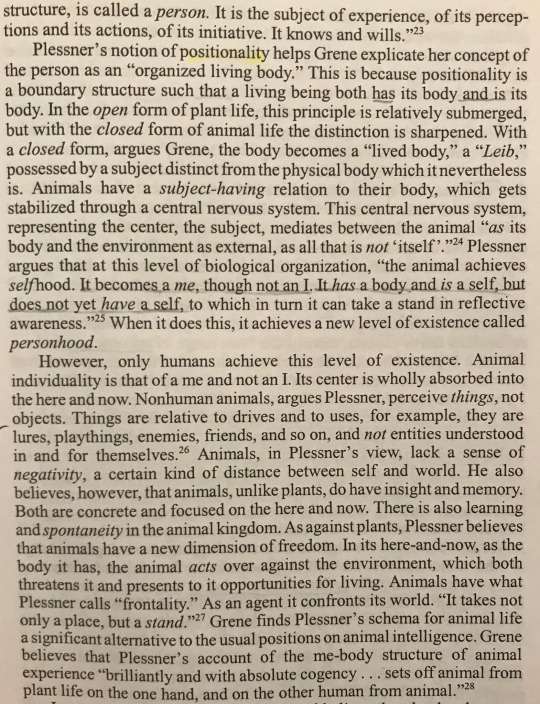
Jacquelyn Ann K. Kegley, 'The Contextual Human Person' in The Philosophy of Marjorie Grene
#jacquelyn ann k. kegley#marjorie grene#helmuth plessner#anthropology#biology#persons#self#boundaries
1 note
·
View note
Text

The Philosophy of Marjorie Grene
1 note
·
View note
Text
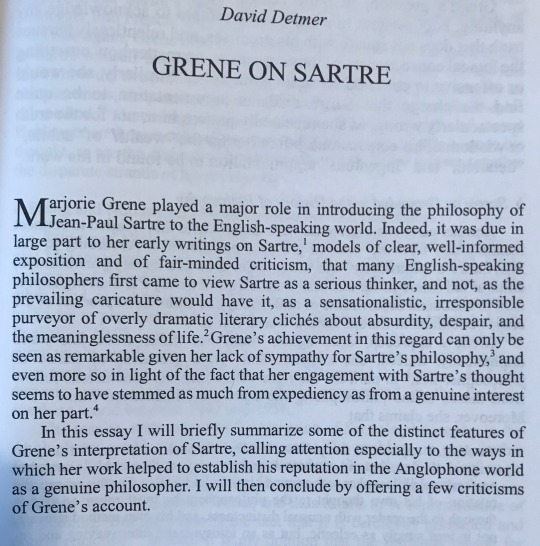
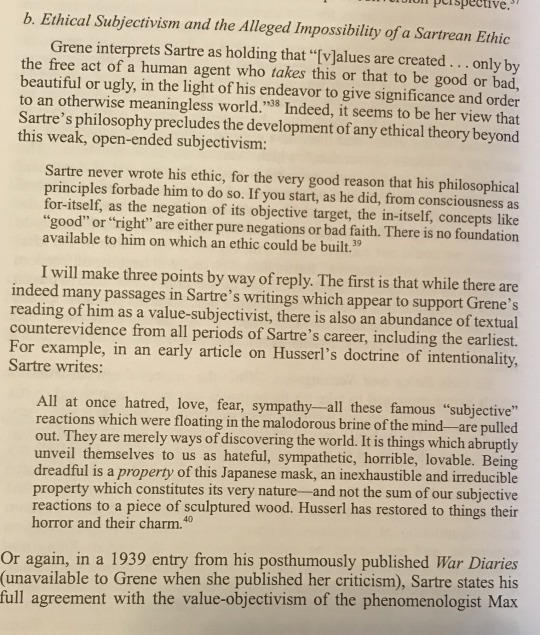

David Detmer, Grene on Sartre (in the Philosophy of Marjorie Grene)
3 notes
·
View notes
Text

Eugenie Gatens-Robinson, The Telic Character of Life (in the Philosophy of Marjorie Grene)
2 notes
·
View notes
Text
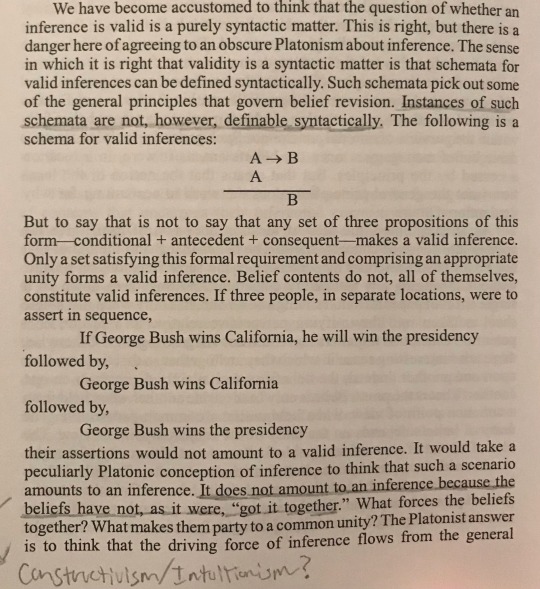

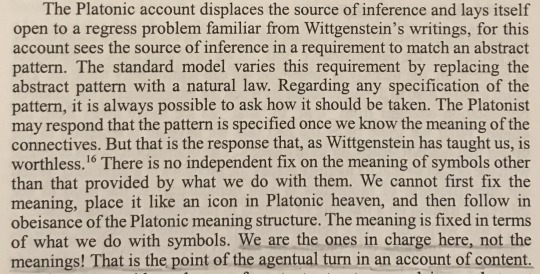
Michael Luntley, 'Agency and Our Tacit Sense of Things' in The Philosophy of Marjorie Grene
I believe that inference is valid because of the structure of hypothetical conditional (if-then) propositions of our judgments and not just some vague appeal to "Platonic beliefs". I'm not sure if that makes me a 'Platonist', and I think Luntley possibly addresses my answer when he refers to the "meaning of connectives" but like Marjorie Grene in her reply to this paper I'm having trouble making sense of this -


0 notes
Text
We really must get over the absurdity of holding what is cultural to be unreal. After all, acid rain is real, smog is real, the bomb is real. And if ostrich-like we choose to ignore the evils that are our own doing, our ignorance is real.
Marjorie Grene
15 notes
·
View notes
Text
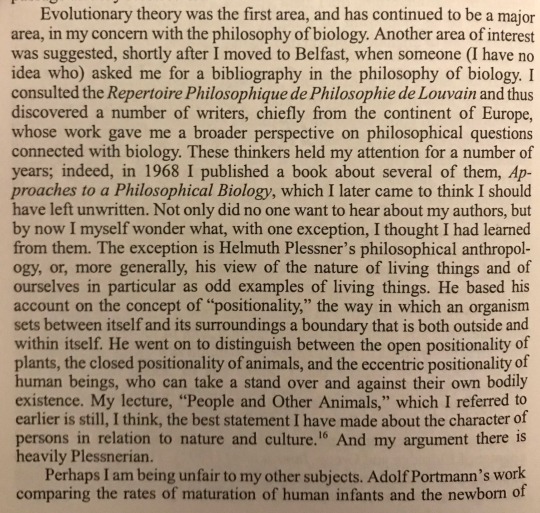

Marjorie Grene, Intellectual Autobiography in The Philosophy of Marjorie Grene
#marjorie grene#helmuth plessner#adolf portmann#erwin straus#immanuel kant#anthropology#biology#geist#persons#naturalism#history of philosophy#history of science#kurt goldstein
0 notes
Text
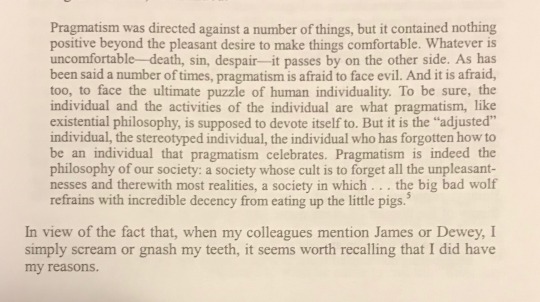


Hot takes from Marjorie Grene.
Bonus reaction from a colleague:
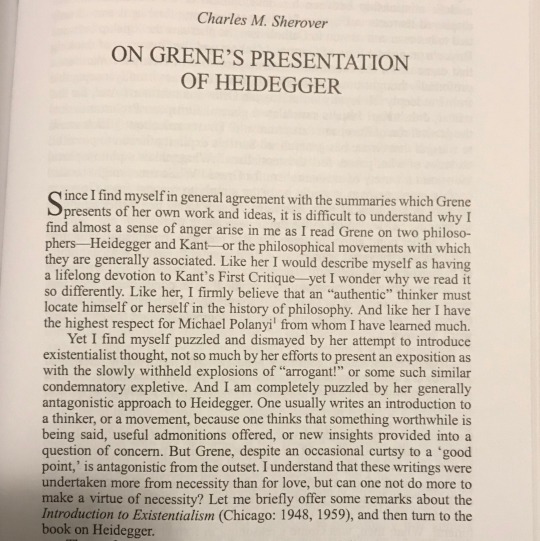
0 notes